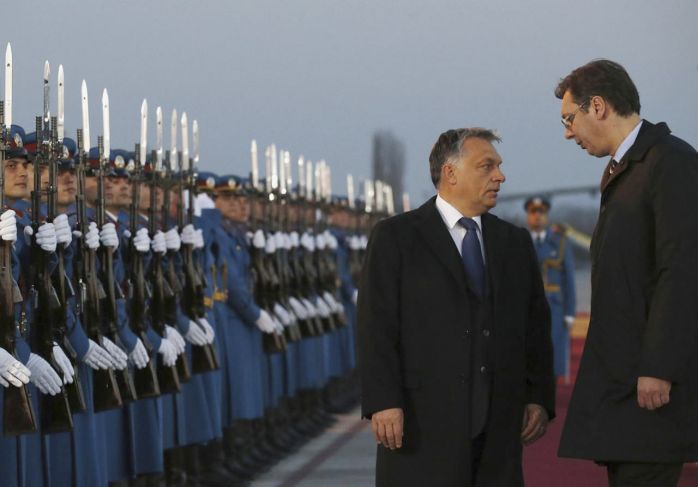The rise of the right in Europe continues apace. Voters who lived under communist oppression thirty-five years ago are increasingly turning to extreme Moscow supported right-wing parties bent on ending liberal democracy in their countries and turning towards authoritarian models of governance.
In Hungary On April 3rd, Victor Orban led his Fidesz Party to an overwhelming re-election victory despite a concerted attempt by the opposition to unseat him. As Orban said on election night, "We won a victory so big that you can see it from the moon, and you can certainly see it from Brussels". Indeed, his party won 135 out of 199 parliamentary seats, and Orban won the largest percentage of the popular vote of any leader since the fall of communism.
Orban’s reference to Brussels reflects his campaign slogans that identified the European Union (EU), the Hungarian left, the international media, and Ukraine’s President Volodymyr Zelensky as his main opposition.
Two days after the election, EU President Ursula von der Leyen announced that it would begin cutting transfer payments to Hungary over its disregard for rule of law and its weakening or outright destruction of democratic institutions.
Most telling was his criticism of the Ukrainian President. Orban is very close to Russian dictator Vladimir Putin and enjoys easy access to cheap Russian fuel. He has come out in favor of the Russian invasion of Ukraine and has refused to allow the transit of weapons for Ukraine through Hungary.
Putin’s goal of dividing the EU and NATO is succeeding given Hungary’s membership in both.
Russia is moving throughout Europe in pursuit of its geopolitical goals.
Also on April 3rd, Serbians re-elected right-wing President Aleksandar Vučić. In the past, Vucic has run on a pro-European platform, but Serbia continues to maintain significant relations with Russia – military cooperation, economic interests, and Slavic cultural affinity.
President Vučić, who has repeatedly won elections on a pro-EU platform, would make an enormous mistake not to opt for the EU chair, though in doing so he will need to give up his control of the press and accept a far more independent judiciary ready to take on corruption and other official malfeasance.
Will this be acceptable to an authoritarian leader like Vučić?
I doubt it.
Although Serbia has voted in favor of U.N. resolutions that condemn the bloody Russian attacks in Ukraine, it has refused to join international sanctions against its allies in Moscow or to outright criticize the apparent atrocities committed by the Russian troops there.
Serbia also recently took delivery of a sophisticated Chinese anti-aircraft system. China is allied with Russia in promoting authoritarian governance in opposition to the liberal democratic model of the West.
In addition, Russia has financed much of French extreme right leader Marine LePen’s party over the past few years. In my view, there is no doubt that should she win the upcoming runoff presidential election on April 24th, a major shift in European and global politics would occur. While she is not expected to win, “The extreme right has a lot of support in our country,” Macron’s junior minister for Europe, Clement Beaune, said in an interview. “There is a battle to be won.”
Indeed, Russia is known to back most extreme right-wing parties in Europe. Germany’s AfD, France’s LePen, Italy’s Matteo Salvini, and Austria’s Freedom Party, have all struck deals with Russia.
Russia benefits not only from the opportunity to sow discord in Europe and across the Atlantic, but also in the European Parliament, where extreme right-wing Members of the European Parliament voted in favor of Russia’s annexation of Crimea. Russian funding is a reward for adhering to Russian domestic foreign policy imperatives.
Indeed, Russia capitalizes on the rejection of the European Right of Western cultural values such as women’s rights, LGBTQ rights, Muslim immigration, progressive human rights, and the perceived chaos that comes from political jockeying for power in representative democracies.
They seek comfort in strong leadership, traditional moral values, and extreme nationalism.
Going forward, a critical factor to consider will be whether the severe economic sanctions placed on Russia will affect its ability to continue funding these movements.
For now, unless things change, Orban’s strong performance in the heart of NATO and the EU does not bode well for Europe.
Keep reading: The Legacy of an ex-King
Edición: Laura Espejo
INAH interviene deterioro del Cristo Negro Señor de San Román en la capital de Campeche
La Jornada Maya
La entidad se ubica entre las cuatro que concentran el 60.9 por ciento de ese gasto
Juan Carlos Pérez
